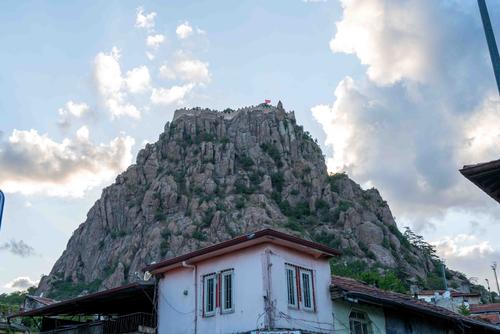I am visiting my mother in my hometown, Afyonkarahisar. It has a long name, consisting of three words: Afyon-Kara-Hisar. "Afyon" means opium; historically, the region was famous for hashish plant cultivation and opium production. Currently, opium production is strictly controlled; fields are monitored and opium-containing skins of plants must be surrendered to the state. A factory produces various alkaloids (mainly morphine) used in the pharmaceutical industry. The plant's seeds also have commercial value, primarily for oil extraction and culinary use.
Karahisar, the "Black Castle" was the historic name of the town, but it later became known simply as Afyon, a name I have always known. In recent years, the government officially changed the name to its current format, possibly as part of an effort to revive Ottoman heritage. The name derives from a rock formation that rises 212 meters from its base, which served as a fortress in the past. There are numerous claims regarding how and why it was used, but I won't delve into its detailed history here. If you're interested, you can search for "Afyon Kalesi" online.
On the SE face, steps were carved into the rock, providing a gentle climb to the top, I think I was 10 years old when I climbed first time. Roughly 20 years ago, the municipality decided to "restore" the fortress, making access easier by constructing a staircase. Unfortunately, like many restoration projects in Turkey, this effort was disastrous and left the castle scarred.
The eastern face of the rock. The old city was built around the rock, mainly on the SE side, later gradually expanded further north and east. The most recent expansion of the city has been towards the west and further north. The city had never expanded in this direction because this area is the floodplain of a river. Water buffaloes used to inhabit this area, so I don't think it's sensible to construct tall towers here, especially considering the town's high earthquake risk.
The SE face and the old town. It is hard to miss new additions and restored parts
The SE view of the town from the castle showcases the old city. A yellow sign indicates that the castle is a registered cultural heritage site that must be protected.
The ruins of an old building contrast with recent additions. The large green roof belongs to an ancient Seljuk Mosque dating back to 1277.
The stairs; the top right hand side 4 steps are the original steps that were carved out from the rock.
The view looking down from the edge of the battlement.
The municipality is building a cable car but I'm not sure if it's a good idea. You can see the concrete frame of the terminal building down at the edge of the hills
In camera panoramic view of the north from the flag pole.
The flag pole decisive moment :)
Ancient water cisterns.
A restoration marvel!










